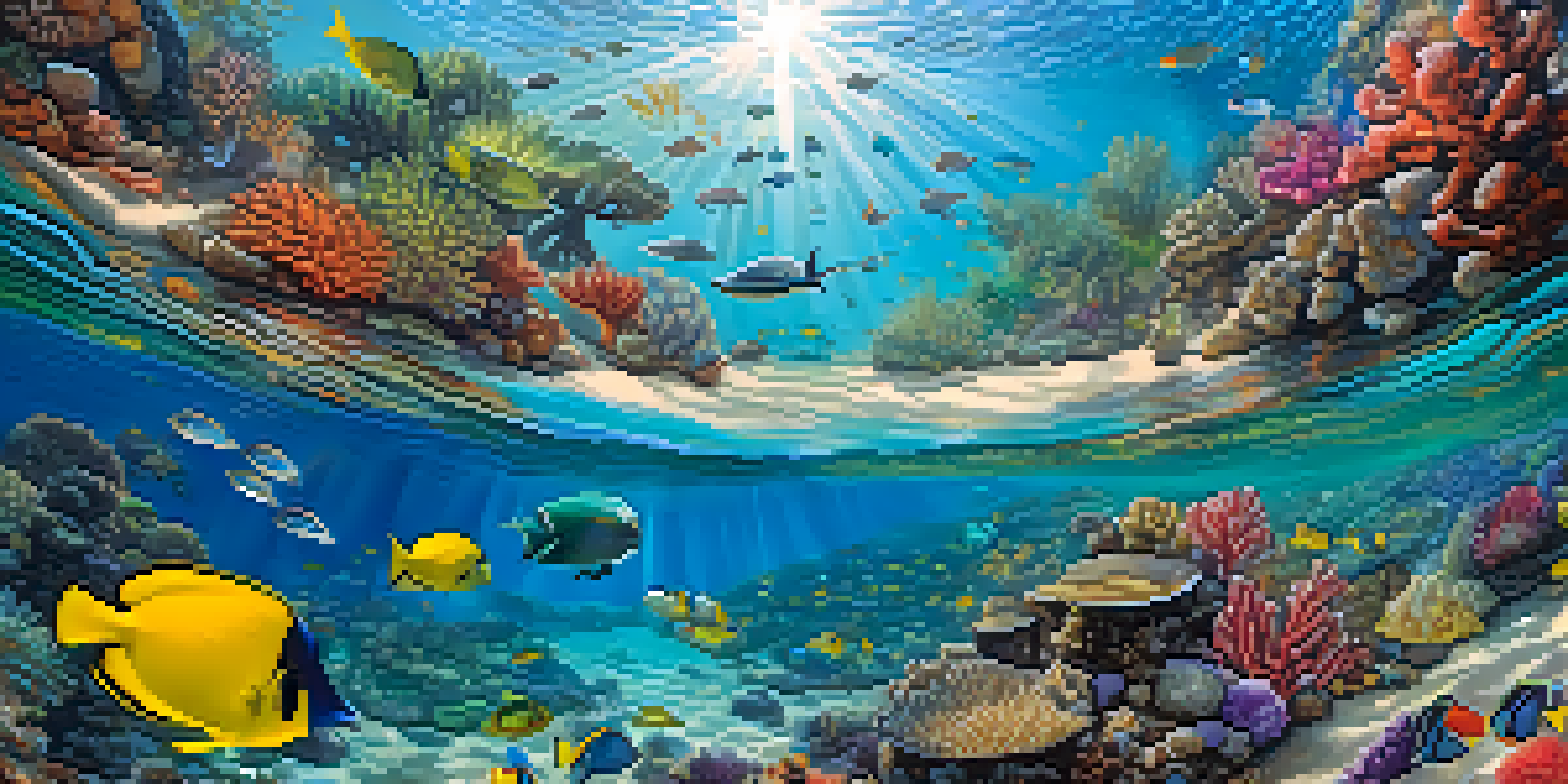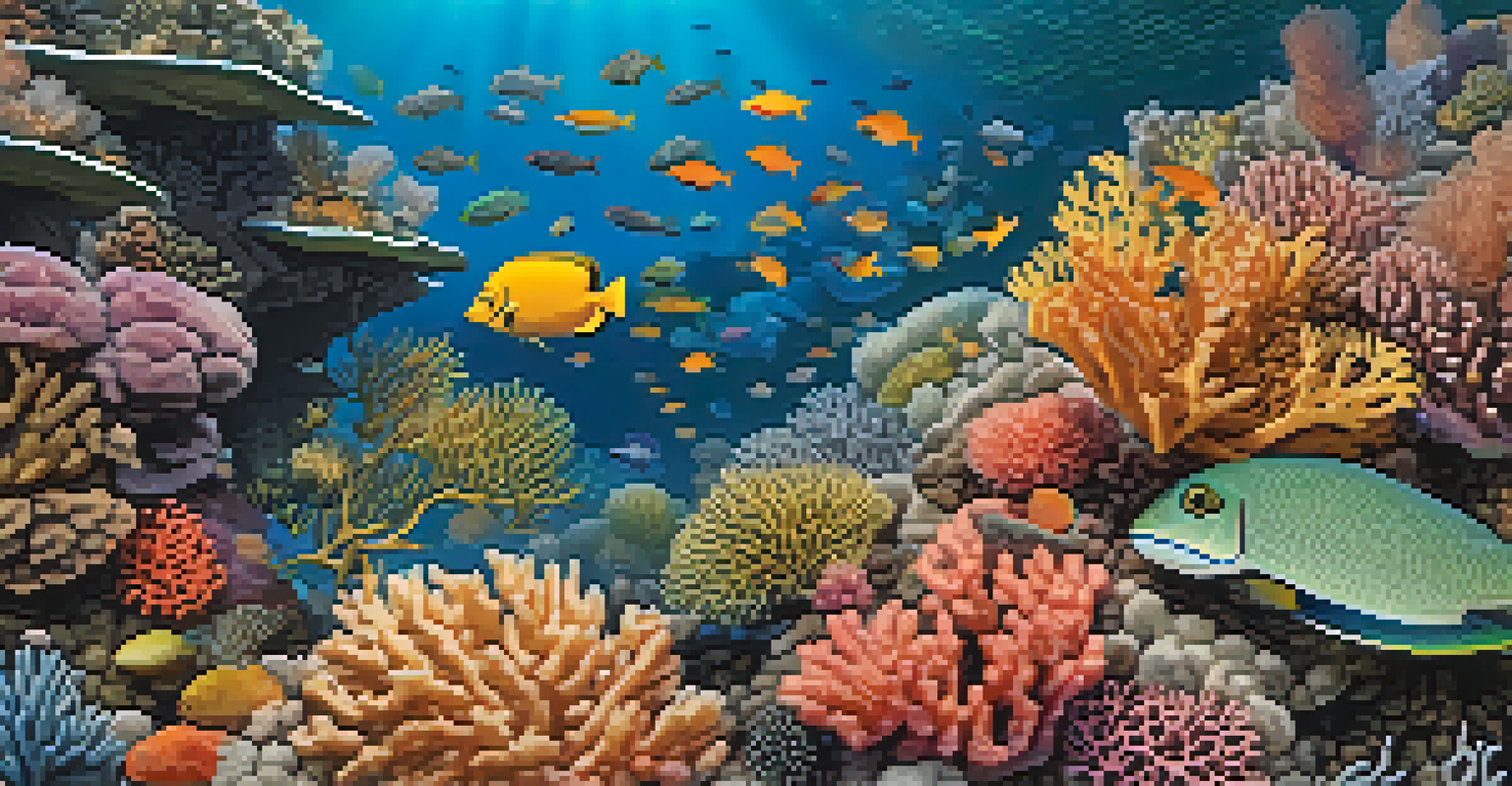The Role of Coral Reefs in Hawaii's Marine Ecosystems

Understanding Coral Reefs and Their Importance
Coral reefs are often referred to as the rainforests of the sea due to their incredible biodiversity. These vibrant ecosystems, primarily made up of tiny coral polyps, are crucial for maintaining the health of marine environments. In Hawaii, coral reefs provide habitat for numerous marine species, from colorful fish to larger predators.
The ocean is a source of life and sustenance, and its health reflects the health of our planet.
Beyond just being beautiful, coral reefs play a vital role in protecting coastlines from erosion. They act as natural barriers, absorbing wave energy and reducing the impact of storms, which is especially important in Hawaii where coastal communities are at risk.
Moreover, coral reefs contribute significantly to the local economy through tourism and fishing. Diving, snorkeling, and fishing activities draw millions of visitors each year, making the preservation of these reefs essential for both ecological balance and economic stability.
The Biodiversity of Hawaii's Coral Reefs
Hawaii's coral reefs are home to an astonishing variety of marine life, with many species found nowhere else on Earth. This unique biodiversity includes over 400 species of fish and 250 species of coral, showcasing the ecological richness of these underwater habitats. Each organism plays a specific role, contributing to the overall health of the reef system.

One fascinating example is the Hawaiian green sea turtle, which relies on coral reefs for food and shelter. These turtles are not only iconic to Hawaii but also serve as indicators of the reef's health. When their populations thrive, it signals a balanced ecosystem; however, their decline can indicate underlying environmental issues.
Coral Reefs: Critical Ecosystems
Coral reefs are vital for marine biodiversity, coastal protection, and local economies, particularly in Hawaii.
The interdependence of species within the reef ecosystem is a striking illustration of nature's complexity. For instance, cleaner wrasses will remove parasites from larger fish, promoting health and vitality within the community, while also ensuring their survival through a mutualistic relationship.
Coral Reefs and Climate Change Threats
Climate change poses a significant threat to coral reefs globally, and Hawaii is no exception. Rising ocean temperatures lead to coral bleaching, a phenomenon where corals expel the algae living in their tissues, resulting in a stark white appearance and increased mortality rates. This not only impacts the corals themselves but also the myriad of species that depend on them for survival.
Protecting our coral reefs is not just about preserving beauty; it's about ensuring the future of our marine ecosystems.
Moreover, ocean acidification, caused by increased carbon dioxide levels, weakens coral skeletons, making it difficult for them to grow and recover. This gradual deterioration can have cascading effects on the entire marine ecosystem, leading to reduced biodiversity and altered food webs.
Local initiatives and global efforts are crucial to combat the impacts of climate change. Protecting these reefs through sustainable practices, such as reducing pollution and overfishing, can help bolster their resilience and ensure they continue to thrive for future generations.
Human Impact on Coral Reefs in Hawaii
Human activities have a profound effect on the health of coral reefs in Hawaii. Pollution from land runoff, overfishing, and coastal development can lead to habitat degradation and diminished biodiversity. For example, excess nutrients from agricultural runoff can trigger algal blooms that smother corals, further stressing these vital ecosystems.
Tourism, while beneficial economically, can also contribute to the decline of coral reefs. Poorly managed diving and snorkeling practices can cause physical damage to the reefs, while sunscreen chemicals can be harmful to coral health. Awareness and education about responsible tourism practices are essential to mitigate these impacts.
Climate Change Threatens Reefs
Rising ocean temperatures and acidification pose significant risks to coral reefs, impacting their health and the species that depend on them.
Community engagement plays a pivotal role in reef conservation. By involving local residents and visitors in cleanup efforts and educational programs, we can foster a culture of stewardship that prioritizes the protection of Hawaii's coral reefs for years to come.
Conservation Efforts to Protect Coral Reefs
Efforts to conserve Hawaii's coral reefs are underway, with various organizations working to restore damaged areas and promote sustainable practices. Restoration projects often involve coral gardening, where fragments of healthy coral are cultivated in nurseries before being transplanted back to the reef. This approach not only helps rehabilitate damaged ecosystems but also raises awareness about coral conservation.
Additionally, establishing marine protected areas (MPAs) allows for the preservation of critical habitats and the replenishment of fish populations. These zones restrict certain fishing and recreational activities, giving coral reefs a chance to recover and thrive in a more balanced environment.
Public education and outreach programs also play a vital role in conservation efforts. By informing the community about the importance of coral reefs and the actions they can take to protect them, we can build a more informed and proactive society committed to safeguarding these invaluable ecosystems.
The Cultural Significance of Coral Reefs in Hawaii
Coral reefs hold deep cultural significance for the people of Hawaii, often intertwined with their history, mythology, and identity. Many Hawaiian traditions and practices, such as fishing and gathering, are directly linked to the health and abundance of coral reefs. This connection emphasizes the need for sustainable practices that honor these age-old traditions.
In Hawaiian culture, the ocean is viewed as a source of life and sustenance, with coral reefs serving as a vital part of that ecosystem. The concept of 'Aloha ʻĀina,' which translates to love of the land, extends to the ocean and emphasizes the importance of caring for the marine environment.
Cultural Ties to Coral Conservation
Coral reefs are deeply woven into Hawaiian culture, highlighting the necessity of integrating traditional practices into modern conservation efforts.
By integrating cultural values into conservation efforts, we can create a holistic approach that respects both the ecological and cultural dimensions of coral reefs. Engaging local communities in the conversation about reef health can foster a sense of responsibility and connection to the ocean.
Looking Ahead: The Future of Coral Reefs in Hawaii
The future of coral reefs in Hawaii depends on our collective actions today. With ongoing threats like climate change and human impact, proactive measures are essential to ensure these ecosystems can endure. Investing in research, conservation, and community engagement will be pivotal in shaping a resilient future for coral reefs.
Innovative solutions, such as coral restoration and breeding programs, are being explored to enhance the resilience of coral species against environmental stressors. By understanding how corals adapt to changing conditions, scientists can develop strategies to support their survival.

Ultimately, fostering a culture of stewardship and awareness around coral reef conservation can empower individuals and communities to take action. Together, we can work towards a future where Hawaii's coral reefs continue to flourish and support the diverse marine life that calls them home.